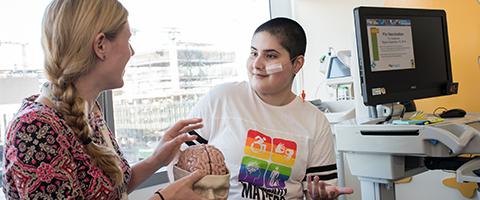Alex Gomez began experiencing chronic pain as a toddler. At 13, they were diagnosed with Crohn’s disease but the diagnosis offered little relief. Over the next five years, the pain, especially severe abdominal pain, forced Alex into a disheartening routine of medications, emergency department visits and hospital stays. Then, in 2016, Alex developed abscesses and fistulae that resisted healing. It ultimately lead to a total proctocolectomy in 2017, which caused a massive wound in their perineum. “No one could figure it out and I wound up back in the hospital,” they say. “I was there for about nine months and was bed bound for so long I lost my ability to walk. I was on so many opiates and nothing worked…. I was screaming 24 hours a day. Nurses were crying because they couldn’t do anything and the doctors started blaming me, telling me I should tough it out.”
At that point, Alex’s insurer okayed their transfer to UCSF Benioff Children’s Hospital San Francisco, despite Alex having recently turned 19. “That first day at UCSF, doctors from almost every specialty showed up,” they say. A dermatologist quickly diagnosed pyoderma gangrenosum, a condition believed to be an autoimmune disease, which can lead to deep ulcers and chronic wounds – and the interdisciplinary team, including the Integrated Pediatric Pain and Palliative Care (IP3) team – initiated a new treatment regimen.
“It included autoimmune therapies, new methods for treating the physical wound and working toward getting Alex off the opioids, in part by integrating tools like physical therapy, massage, acupuncture, music and art,” says Amber Borucki, MD, pediatric pain director for the UCSF Department of Anesthesia and Perioperative Care.
Simultaneously, IP3 psychologist Cristina Benki, PhD, began working with Alex on their psychological wounds, which included post-traumatic stress disorder from a lifetime of pain and disability.
“I felt like a car that needed to be in a junkyard and after experiencing all the trauma and malpractice in other places, trust was hard,” Alex says. “UCSF and Cristina changed that. It was huge for me, having somebody to talk to. I still have triggers – like when I have to come back to the hospital for a procedure – but I’m working hard with Cristina to develop coping mechanisms.”
After a five-month stay at UCSF, Alex returned home, where they continue to make progress. The wound is 60 percent healed, they are walking again, completely off hydromorphone and weaning off methadone.
In addition, Alex has become a powerful advocate. They work closely with various groups and have served as an honored hero at a walk for the Crohn’s & Colitis Foundation. “UCSF encourages advocacy and don’t feel threatened by a patient who has knowledge or suggestions. I was part of the care team,” says Alex, who is planning to return to college and eventually make their way to medical school. “I’ve begun to believe I can accomplish all of the things I dream of.”
Story by Andrew Schwartz. Photography by Barbara Ries.
